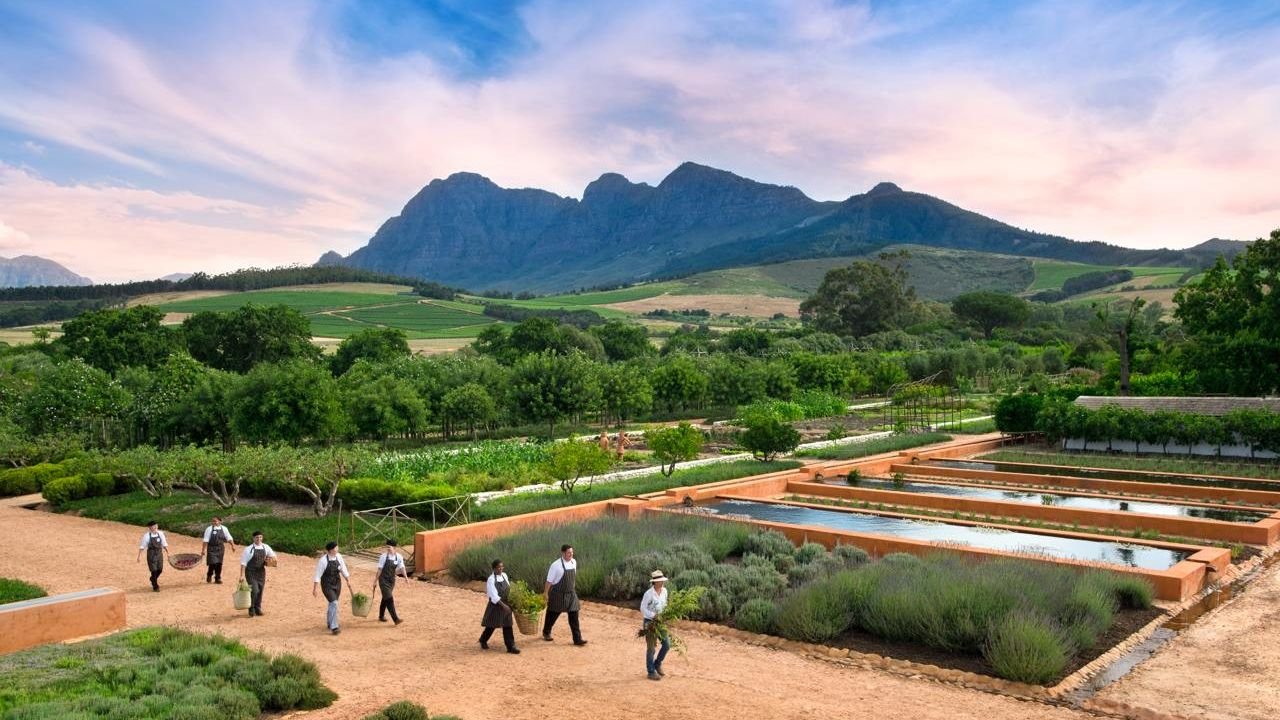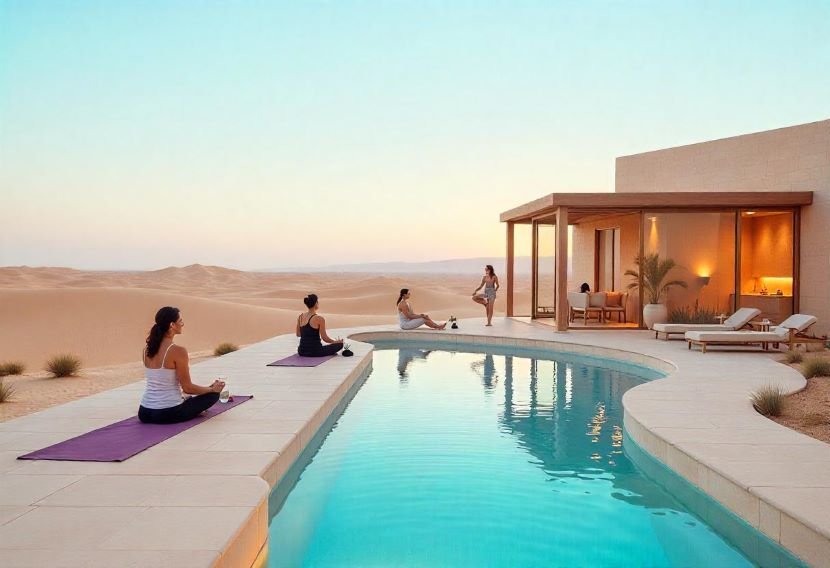Wellness Travel
Experts Suggest Inclusive Strategy For Growth In Medical And Wellness Tourism

By Chanchal Mukherjee
New Delhi: Experts have suggested certain strategies to usher in transformative growth in medical and wellness tourism in the country including bringing together thought leaders and policymakers across healthcare sector and integrate centuries-old wellness traditions to make India a better destination for medical value travel.
Highlighting the key recommendations and suggestions given during the discussion, Dr Subhash Goyal, chairman of Aviation and Tourism expert committee of the Indian Chamber of Commerce, told ETV Bharat, “There is need for a nationwide ecosystem built on trust, accessibility and quality to support the growing demand for medical and wellness travel and a unified national policy to provide a standardized experience for international patients as India’s medical tourism sector is highly fragmented, with six ministries and multiple sectors involved.’
Rajiv Mehra, General Secretary of Federation of Associations of Indian Tourism & Hospitality (FAITH), said, “The government should come forward and promote health care and wellness tourism in India as well as abroad to grow this sector. Currently, most of the hospitals have their tie ups with outside the countries that’s why health care tourism come to India.”
Experts suggested promotion of Indian traditional healing and wellness measures to create an alternate economy, unified National and State-Level Heal in India Missions, and formation of treatment and wellness tourism clusters.
On health care and wellness tourism, Satinder Pal Singh, tourism expert, told ETV Bharat, “All kinds of tourism help our economy grow. I have noticed patients from our neighbouring countries often visit India for medical tourism because treatment is much cheaper in India than in several other countries.”
He added, “If patients from other nations come to India for treatment then it will definitely help generate employment opportunities and the hotel industry because during treatments of dental or skin ailments, people don’t prefer to get admitted for several days. They visit hospitals for a few hours then return back to their hotel rooms or start visiting tourist places which obviously help grow tourism,” Singh said.
The Federation of Hotel and Restaurant Associations of India (FHRAI), in collaboration with KPMG in India, has launched its flagship report titled “Heal in India: Catalysing Medical and Wellness Tourism for a Healthier Global Future.” The report outlines a transformative national strategy that integrates India’s clinical expertise with its centuries-old wellness traditions, aiming to make the country the world’s most trusted destination for Medical Value Travel (MVT).
Suman Billa, Additional Secretary and Director General, Ministry of Tourism, quoted, “India should create a global movement putting all stakeholders on one platform and building trust. The tourism economy is reaching $3 trillion USD in the coming years and for that, several areas need to be activated. Medical and wellness tourism are strategic pillars to achieve this target. We will have to showcase not only our competence but also our care, compassion, and delivery,” He mentioned
Grish Oberoi, Honorary Treasurer of the Federation of Hotel and Restauration Associations of India (FHRAI) told ETV Bharat, “There were several hospitality and hospitals experts discussing how the sector can be promoted in India.”
Medical Tourists
As per FH&RA report, India already attracts over two million medical tourists every year, with patients coming from more than 75 countries, including Bangladesh, Iraq, the Maldives, Nigeria, and developed nations such as the United States, Canada, and the UK. In 2024 alone, over 463,000 medical visas were issued, showing a strong rebound in the sector post-Covid.
Growth by 2035
FH&RA. in its report stated, India’s Medical Tourism Market is set to surge from USD 18.2 billion in 2025 to USD 58.2 billion by 2035, at a CAGR of 12.3 per cent.
Recommendations
Launch National and State-Level Heal in India Missions with stakeholder coordination, and create treatment-specific and wellness tourism clusters in states like Kerala (Ayurveda), Delhi NCR (advanced care), Maharashtra (multispecialty).
Wellness Travel
Sabah’s Hidden Wellness Treasures Await on Eco-Tourism Packages Now Available – Unlock Secret Deals Before They’re Gone!

Tuesday, July 22, 2025
In an effort to align with evolving global tourism trends, community-based tourism operators in Sabah have been encouraged to enhance their offerings by incorporating wellness elements into their tourism products. This call to action was made by Datuk Joniston Bangkuai, the Assistant Minister for Tourism, Culture, and Environment in Sabah, who emphasized the importance of integrating wellness practices into tourism packages to stay competitive and meet the rising demand for eco-wellness experiences. As wellness tourism continues to grow in popularity worldwide, Bangkuai believes that Sabah’s rich natural resources, clean environment, and cultural heritage provide the perfect foundation for promoting wellness-focused tourism.
Sabah’s Natural and Cultural Assets: A Strong Foundation for Wellness Tourism
Sabah, renowned for its stunning landscapes, pristine air, and vibrant culture, is uniquely positioned to tap into the growing wellness tourism market. The state’s diverse natural beauty and tranquil environment provide the ideal backdrop for eco-wellness tourism, which focuses on health, mindfulness, and rejuvenation. Bangkuai’s call for integrating wellness elements into community-based tourism products highlights the potential for rural areas to offer authentic and enriching experiences for visitors seeking to relax, recharge, and reconnect with nature.
The concept of wellness tourism has evolved significantly in recent years. What was once considered a niche sector has now become a mainstream trend. Today’s travelers are not just looking for sightseeing opportunities; they are increasingly drawn to destinations that promote mental, physical, and emotional well-being. This shift in traveler preferences presents an exciting opportunity for Sabah’s tourism operators, especially those in rural communities, to enhance their offerings by integrating wellness practices into their tourism packages.
Encouraging Rural Communities to Think Beyond Sightseeing
During the Program Jejak Kanser held in Pekan Kiulu on Tuesday, July 22, 2025, Bangkuai urged rural tourism operators to go beyond traditional sightseeing tours by incorporating wellness elements into their packages. Simple additions, such as offering mindful activities, traditional healing practices, and healthy local meals, could significantly enrich the visitor experience. These changes, while seemingly small, can have a meaningful impact on rural tourism, creating a more holistic and immersive experience for tourists.
Mindfulness activities, such as meditation sessions, yoga, or nature walks, could be integrated into existing tourism offerings to promote relaxation and stress reduction. Traditional healing practices, which are often deeply rooted in Sabah’s indigenous cultures, could also play a key role in providing visitors with unique wellness experiences. Additionally, the promotion of healthy local cuisine, made with fresh, natural ingredients, would allow visitors to experience the state’s rich culinary heritage while benefiting from its health-conscious offerings.
Wellness Tourism: A Growing Global Trend
Bangkuai’s emphasis on wellness tourism is in response to the growing global trend where travelers increasingly seek destinations that offer a combination of relaxation, health, and wellness. The rise of wellness tourism has been driven by a broader shift in consumer behavior, with people becoming more health-conscious and seeking out experiences that support their mental and physical well-being. For many travelers, the idea of a vacation has evolved beyond leisure and entertainment; it now encompasses the pursuit of health, tranquility, and personal growth.
The tourism sector in Sabah has an opportunity to capitalize on this global trend by offering wellness-focused experiences that cater to a wide range of tourists, from those seeking relaxation to those looking to engage in more active forms of wellness, such as hiking, yoga retreats, or nature-based therapy. Wellness tourism is no longer a niche market but a broad and diverse sector that can attract a wide range of travelers, from millennials seeking wellness getaways to retirees looking for restorative vacations.
Sabah’s Commitment to Sustainable Wellness Tourism
Bangkuai pointed to the success of the Sustainable Wholistic Wellness International Conference and Expo, which was held in Sabah last month, as a strong signal that the state is ready to take a leadership role in wellness tourism. The conference brought together experts, practitioners, and stakeholders from around the world to discuss sustainable wellness practices and how they can be integrated into tourism. This event underscored Sabah’s growing commitment to promoting wellness as a key aspect of its tourism offerings.
The state’s focus on sustainability aligns perfectly with the principles of wellness tourism, which emphasizes the importance of environmentally friendly practices and the integration of nature into the visitor experience. Sabah’s rural communities, many of which are already engaged in sustainable living practices, are particularly well-positioned to offer genuine wellness experiences that are both eco-friendly and rooted in local traditions.
Kiulu: A Model for Healthy Rural Communities
As part of the broader Sabah Maju Jaya agenda, which focuses on the development of tourism, agriculture, and manufacturing, Kiulu has been identified as a potential model for healthy and thriving rural communities. The agenda aims to transform Kiulu into a destination that showcases the benefits of integrating wellness into rural tourism. Bangkuai emphasized that by incorporating wellness practices into the region’s tourism offerings, Kiulu could set an example for other rural communities in Sabah and beyond.
Kiulu, known for its natural beauty and close-knit community, is ideally suited to promote wellness tourism. The area’s lush forests, clear rivers, and tranquil environment provide the perfect backdrop for nature-based therapy sessions and outdoor wellness activities. By offering regular health screenings, nature-based therapies, and awareness programs, Kiulu could not only attract wellness-focused tourists but also promote healthy living among its residents. This would have a positive impact on both the local community’s well-being and the region’s tourism industry.
Establishing a Wellness Centre to Support the Vision
Bangkuai suggested that the establishment of a wellness center in Kiulu could further support the vision of transforming the area into a healthy and vibrant rural community. A wellness center could serve as a hub for various health and wellness activities, such as yoga classes, meditation sessions, and traditional healing practices. It could also provide educational programs on sustainable living and healthy lifestyle choices, benefiting both locals and tourists.
By integrating wellness elements into tourism, Kiulu could not only improve the quality of life for its residents but also create new economic opportunities. A wellness center would attract both local and international visitors who are seeking restorative and rejuvenating experiences. This could lead to job creation, the development of new businesses, and increased revenue for the local economy.
The Economic and Social Benefits of Wellness Tourism
Integrating wellness into tourism offers significant economic and social benefits for both visitors and locals. For visitors, the opportunity to experience wellness-focused activities in a peaceful, nature-rich environment provides a unique and transformative experience that goes beyond traditional sightseeing. The ability to reconnect with nature, relax, and rejuvenate can lead to a deeper connection with the destination and a more memorable travel experience.
For local communities, the growth of wellness tourism presents new economic opportunities. By offering wellness-based tourism packages, rural areas like Kiulu can attract a new type of traveler, one that is interested in more meaningful, health-focused experiences. This can help diversify the local economy, create new jobs, and provide sustainable income for local businesses. Moreover, the integration of wellness into tourism can also improve the overall quality of life in rural communities by promoting healthy living and fostering a culture of well-being.
A Vision for the Future of Sabah’s Tourism Industry
The call to integrate wellness elements into community-based tourism in Sabah reflects a forward-thinking approach to the region’s tourism development. By capitalizing on its natural beauty, clean environment, and cultural richness, Sabah can position itself as a leader in the growing wellness tourism market. The incorporation of wellness practices, such as mindful activities, traditional healing, and healthy local meals, will not only enhance the tourism experience but also contribute to the long-term economic and social well-being of the region.
With its focus on sustainability, community health, and the promotion of wellness tourism, Sabah has the opportunity to attract a new generation of travelers who are seeking more meaningful, rejuvenating experiences. By embracing this shift in global tourism trends, Sabah can ensure that its tourism industry remains competitive and continues to thrive in the years to come.
Tags: Community-based tourism, cultural tourism Sabah, eco-wellness, healthy local meals, Kiulu wellness, nature-based therapy, rural tourism, Sabah Maju Jaya agenda, Sabah tourism, sustainable tourism, tourism and wellness, tourism development Sabah, Tourism Trends, Traditional Healing, Wellness Center, Wellness Experiences, wellness tourism, wellness tourism in Malaysia
Wellness Travel
Agritourism and Regenerative Farming Are the Latest Wellness Travel Trends

A growing number of travelers are starting to ask the same questions around work and wellness—and finding their answers in the soil. Farm hospitality, a modern evolution of agritourism where beauty, design, and land stewardship merge, suddenly feels more relevant than ever.
“Travelers are looking for meaning,” says Isaac French, founder of Experiential Hospitality. “They want to slow down and experience something real, especially in a screen-saturated and overstimulated world. Regenerative farming represents quite possibly the single biggest setting for that experience and transformation.”
Perhaps that’s why the modern agritourism market is in full bloom, growing 12% yearly and poised to reach $14.5 billion by 2029. A constellation of forces—including piqued curiosity in regenerative agriculture, an evolving definition of well-being, and a hunger for IRL connections—is cultivating the fertile ground for its rise.
“One of the components of wellness is a sense of being grounded. There, nature can help a little,” reflects Karen Roos, owner and visionary behind Babylonstoren in South Africa and The Newt in England, two estates that have set the bar for the new wave. “Our guests love grounding themselves on a working farm.”
A new era of wellness tourism
No doubt it’s the dual promise of freedom and connection that’s driving wellness tourism as it skyrockets towards becoming a $1.35 trillion market by 2028. When combined with a rising interest in experiential travel, which is expected to top $3.1 trillion by 2025, there seems to be a longing for nature-based escapes. According to Spa Business, 79% of wellness travelers seek outdoor immersion, 75% prioritize healthy cuisine, and 60% demand tranquility.
At their best, farm hotels cover all the bases. They’re not just a stay on a farm—they’re places where guests can interact with and immerse themselves in their surroundings. “People are craving experiences that feel real, where there’s a sense of purpose behind the beauty,” says Mary Celeste Beall, proprietor of Blackberry Farm in Tennessee.
Indeed, science confirms that even 10 minutes outdoors can measurably lower cortisol levels and blood pressure. Other research suggests that the sheer beauty of natural landscapes can amplify these effects, calming the nervous system, and lifting the spirit. A weekend on the farm may actually recalibrate guests’ inner landscapes on a cellular and hormonal level.
Wellness Travel
Now, How the Gulf is Poised to Become a Global Wellness Travel Hub: Here is Everything You Need to Know About It

Monday, July 21, 2025
The travel business is changing fast. Now, in a world once dominated by leisure, sightseeing, and business travel, a new force is shaping tourism — wellness tourism. This has caused a major change in the way people see the value of travel. The Gulf, due to its strategic investments and great natural beauty, is in a great position to take advantage of this growing worldwide trend.
A Fast-Growing Global Market
Wellness tourism is already worth $651bn in 2022 and is projected to more than double to $1.4tn by 2027, representing a CAGR of 16.6%, according to the Global Wellness Institute. This change is not a fad but a fundamental change in how travelers are finding balance, restoration, and meaning in their travels.
Wellness travel can mean a lot more than spa trips or a retreat for a detox. It’s a growing space around the intersection of travel and self care. People aren’t just looking for a vacation, they’re looking for ways to heal from it all — physically, mentally, emotionally. Whether a biohacking clinic in Switzerland or a silent meditation retreat in Bhutan or wellness retreats in the beaches of Oman, the modern day wellness traveller varies widely in their needs and motivations.
There are a variety of reasons for the increase in demand for such experiences. The psychological toll of the Covid-19 pandemic has inspired a reevaluation of priorities for many, with a new premium placed on well-being. And travel-obsessed Millennials and Gen Z-ers, drivers of the global tourism economy, care more about mind-body balance than their forebears. Growing digitization has facilitated access to personalized wellness experiences making it easier than ever for travelers, and this is fuelling growth.
A Case for Gulf as a Wellness Tourism Hotspot
The GCC, in particular Saudi Arabia, the UAE and Oman, is in a unique position to lead the global wellness tourism business. With its sophisticated hospitality facilities, they are not only targeting luxury travelers, but also promoting wellness as an important growth sector.
Destinations such as AlUla in Saudi Arabia, the Hatta Mountains in the UAE, and Oman’s Dhofar coast present natural surroundings that are perfect for immersive wellness programmes. They have serene landscapes, centuries-old ruins and crystal-clean beaches for light yoga, meditation and nature therapies. The Gulf, with its superior air links and range of hospitality products, also has the potential to be the wellness tourism centre of the world.
But tapping this opportunity will take more than fancy resorts. Successful wellness tourism investment projects must have a holistic view. Which means joining the dots when it comes to cross-category collaboration between tourism boards, health companies, tech firms and providers of hospitality services to develop seamless offers from start to finish.
Wellness Tourism – The Comfort Of Being Known, Personalization is Everything
With the advent and ongoing proliferation of wellness tourism, personalization has emerged as a top priority. Travelers will be anticipating experiences customized to their biometric readings, lifestyle tendencies and cultural background. Wellness can no longer be one-size-fits-all. Different travellers will have different requirements, be they emotional recuperation, physical rejuvenation or mental fortitude.
This requirement represents personalization, and it implies technology will have a large part to play. Health solutions based on data will also be critical to give travelers the personalized programs that fit their unique requirements. From specialized fitness plans to dietary guidelines determined by one’s genetic markers, the future of wellness travel is getting more personalized.
Credibility and Standards in Wellness Tourism
Along with the health tourism industry, issues increasingly are being raised by consumers as well as regulators. Governments and operators will need to make sure claims about wellness are evidence-based and standards are high. Wellness should not be a meaningless marketing ploy but a real service that can be shown to provide real benefits.
The Workforce Behind Wellness Tourism
Another consideration is the staff necessitated to support wellness tourism. This is a new industry, in need of new professionals — like holistic health practitioners, mindfulness coaches and traditional medicine therapists. In order to address this need, Gulf nations need to invest in the training and accreditation of professionals to secure their credentials, and compensate them sufficiently to be able to deliver quality services.
A Lucrative Investment Opportunity
When you consider the investment potential, wellness tourism is huge. Wellness travelers spend 35-45% more than the average tourist, according to research. Furthermore, wellness tourism is low volume, high margin and much less seasonally sensitive, which means that in relation to other forms of investment it’s more appealing for developers, sovereign wealth and private equity investors.
Matching Wellness Travel with ESG Objectives
The increasing demand for wellness tourism also dovetails into the broader trend for ESG (Environmental, Social, Governance)-dedicated investments around the world. Environmentally sustainable wellness resorts, nature-based retreats and culturally indigenous healing traditions offer strong financial returns, while also adding value to local communities and the environment. “As investors are searching more for purpose-driven assets, wellness tourism offers a unique opportunity to add value to local communities while being profitable,” said Susie Ellis, the leader of the research team that carried out the study.
Wellness Travel, Post-Pandemic, in the Gulf
In a fractured, uncertain world, travelers are seeking a sense of purpose and equilibrium. Wellness tourism is a manifestation of a larger societal need to connect and take care of ourselves. For the Gulf, it’s an opening to steer the global conversation on purposeful travel in the 21st century.
As the Gulf invests in wellness, it is not only staking out its share of economic value, it is also stamping its mark on a nascent global wellness tourism industry. The destinations that truly embrace this change, grounded in authenticity, with strategic investment and at systems level, will become magnets not just for tourists, but also for the building of ecosystems of health, resilience and renewal. It will also enable the region to become the worlds wellness capital.
Source Credit: www.thenationalnews.com
-

 Brand Stories1 day ago
Brand Stories1 day agoBloom Hotels: A Modern Vision of Hospitality Redefining Travel
-

 Brand Stories6 hours ago
Brand Stories6 hours agoOlive Living: India’s Intelligent, Community-Centric Hospitality Powerhouse
-

 Destinations & Things To Do2 days ago
Destinations & Things To Do2 days agoUntouched Destinations: Stunning Hidden Gems You Must Visit
-

 AI in Travel2 days ago
AI in Travel2 days agoAI Travel Revolution: Must-Have Guide to the Best Experience
-

 Brand Stories3 weeks ago
Brand Stories3 weeks agoVoice AI Startup ElevenLabs Plans to Add Hubs Around the World
-

 Brand Stories2 weeks ago
Brand Stories2 weeks agoHow Elon Musk’s rogue Grok chatbot became a cautionary AI tale
-

 Asia Travel Pulse2 weeks ago
Asia Travel Pulse2 weeks agoLooking For Adventure In Asia? Here Are 7 Epic Destinations You Need To Experience At Least Once – Zee News
-

 AI in Travel2 weeks ago
AI in Travel2 weeks ago‘Will AI take my job?’ A trip to a Beijing fortune-telling bar to see what lies ahead | China
-

 Brand Stories2 weeks ago
Brand Stories2 weeks agoChatGPT — the last of the great romantics
-

 Brand Stories2 weeks ago
Brand Stories2 weeks agoHumans must remain at the heart of the AI story













You must be logged in to post a comment Login